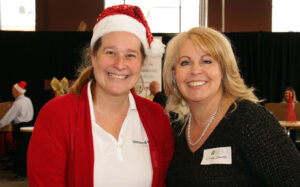A “perfect storm” of circumstances means more millennials are migrating away from urban areas for greener pastures, with one of the driving factors being a lack of affordable and accessible housing, members of the Greater Ottawa Home Builders’ Association were told at a breakfast social held Tuesday.
An insufficient housing supply is no longer just a Toronto problem. “It’s a province-wide issue,” Abacus Data CEO and founding partner David Coletto said during a presentation he delivered to a crowd of nearly 100 attendees at the Centurion Conference and Event Centre on the future of Ottawa’s housing market.
The lack of affordable and accessible housing will likely be “front and centre,” both locally and across Ontario, during the 2022 municipal and provincial elections, he predicted.
Coletto, who runs a boutique market research firm, may resemble the Doogie Howser of data with his youthful looks but he is, in fact, 40 years old, has his PhD in political science and is a director with the Ottawa Board of Trade. He’s also the son of a home builder.
The Breakfast Social with Mayor Jim Watson was sponsored by Tomlinson Group of Companies, represented by its senior vice president of planning and development, Rob Pierce.
GOHBA, which is the voice of the residential construction industry, has a board of directors led by David Renfroe, president of Renfroe Land Management. It delayed its breakfast by one month to allow COVID-19 pandemic restrictions to further relax. The event sold out in two days, said executive director Jason Burggraaf. “People are itching to get back into networking and seeing their colleagues.”



Watson officially addressed the group for his final time as Ottawa’s outgoing leader. He has decided not to run again in the fall election. The mayor personally thanked the industry for its great work. “You get lots of slings and arrows thrown your way, often by municipal politicians, but the fact of the matter is you put your financial necks on the line each and every day when you decide to build a new project, whether it’s one house or a subdivision.”
There’s no question this is going to be a year of change, Watson also said. He encouraged the industry to ask the tough questions of candidates during the upcoming election. “People running for office, they should be upfront with you, with their platform. What I tried to do over the years was underpromise and overdeliver.”

Coletto believes the pandemic has accelerated many of the trends that we were already seeing. “In the case of where we live, it has enabled more people to actually live the way they want or have always wanted to but couldn’t because of the dreaded commute or affordability or lack of technology.”
Coletto is an expert (and member) of the millennial generation, or those born between 1980 and 2000. This group, he said, is now at a stage where they’re increasingly starting families and looking for properties that are affordable and roomier than, say, a cramped downtown condo. On average, a home in Ottawa costs almost $700,000. “Kids of the boomers are now trying to buy a home, and I say ‘trying’ because many of them are losing hope that they’re going to be able to do it.”
The real estate markets in nearby towns have been soaring due to the recent revival of rural living. Bancroft, which has a population of under 5,000, has experienced a surge in housing prices by more than 180 percent — the highest in the province, the room heard.
“Consumers, as we always say, move with their wallets. They are moving, and the data is showing they’re moving out of cities and into smaller communities.”
The pandemic has allowed millions of Canadians across the country to work remotely, either partially or fully, for the past two years. Some employees are happy to skip the daily commute, said Coletto. “Even if us, as employers, want our teams to come to the office, they may not instinctively want to.”
The workplace is shifting toward more hybrid work scenarios, he added. It’s the kind of labour market, said Coletto, where employees denied such an arrangement may feel confident enough to look elsewhere.
“Affordability, demographics and the pandemic have created this perfect storm of a situation that I think is shifting many people’s preferences for where they want to live or allowing them to live the preference they always had”
David Coletto — CEO of Abacus Data
“Affordability, demographics and the pandemic have created this perfect storm of a situation that I think is shifting many people’s preferences for where they want to live or allowing them to live the preference they always had.
“We assumed that people wanted to live downtown and close to amenities, and there are many who want to do that. But, if you have two children and are making $200,000 year in a household, odds are you don’t want to live in a 900-square-foot condo in downtown Ottawa. You may not be able to live in Westboro or the Glebe or Overbrook, and so you’re looking to go farther out, and that’s what we’re seeing in the data going forward.”
Coletto cited data from his 2021 Welch LLP Ottawa Business Growth Survey, another survey he recently did for the Ontario Real Estate Association and from Statistics Canada.
Ottawa-Gatineau is Canada’s fourth-largest metropolitan area, behind Toronto, Montreal and Vancouver, the room heard. Its population grew by 8.9 percent over the last five years, significantly higher than the national average of 5.2. “We are a fast growing city,” said Coletto, while noting that the population grew fastest in the immediate suburbs, or about a 20 minute drive from downtown, and the far suburbs, which is at least a 30 minute drive away.
The breakfast ended with brief comments from Burggraaf, who recognized the need for Ottawa to build more homes for its growing population in order to remain competitive with other markets. “It behooves all of us — us and the City and the public in general — to get ourselves together and produce more housing supply in order to keep Ottawa somewhat relatively affordable.”
Tomlinson Group owns the Centurion, where the breakfast was moved after Infinity Convention Centre was no longer available to host GOHBA on its rescheduled date.






caroline@obj.ca





